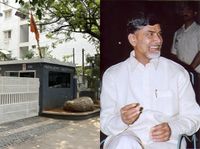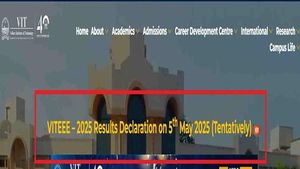In a striking move to reshape Andhra Pradesh's economic landscape, Chief Minister N. Chandrababu Naidu has embarked on a mission to position the state as a premier investment destination. Following the NDA alliance's decisive victory over the YSRCP government in the last general elections, the government has rolled out an aggressive strategy to attract investments and spur industrial development. This initiative includes offering substantial tracts of land to investors, aiming to generate employment and foster economic growth.
However, recent land allocations have sparked controversy, raising questions about transparency and the criteria used in the decision-making process. On April 10, 2025, the state cabinet approved land allocations to several organizations, including Tata Consultancy Services (TCS), a well-established player in the tech industry. TCS received 21.16 acres of land at an astonishingly low rate of ₹0.99 per acre.
In a surprising twist, the Andhra Pradesh government allocated even larger tracts of land to Ursa Clusters Private Limited, a company that was established just two months prior. Ursa Clusters was granted 59.6 acres of land, valued at nearly ₹1,000 crore, to support a proposed ₹5,728 crore investment project in Visakhapatnam. This allocation is more than double the land given to TCS, prompting serious concerns about favoritism and the adequacy of due diligence.
Critics have questioned the rationale behind such generous land allocations to a newly formed company, which lacks any significant corporate history or presence. Ursa Clusters Private Limited was incorporated on February 12, 2025, and its registered address is located in a residential complex in Hyderabad, where no corporate activity could be identified. The building, Ekta Basil Heights, is home to families rather than a functioning office.
The directors of Ursa Clusters, Satish Abburi and Vijayakumar Pendurthi, have connections to the US-registered Ursa Clusters LLC, which was established on September 27, 2024. Koushik Pendurthi, another director, serves as the Chief Product and Technology Officer at Talas Pay. Despite the grand promises of investment, Ursa Clusters Private Limited has a modest capital base, with only ₹10 lakh in authorized capital and ₹1 lakh in paid-up capital, raising further doubts about the company's ability to deliver on its pledges.
Adding to the intrigue, the Telangana government entered into a Memorandum of Understanding (MoU) with Ursa Clusters LLC during the World Economic Forum in Davos on January 24, 2025. This agreement outlined a ₹5,000 crore investment to establish a 100 MW AI-powered data center hub in Hyderabad. Yet, the credibility of such a partnership has been called into question, given the company's infancy and lack of prior business activity.
When reporters from The Wire visited the registered address of Ursa Clusters LLC in the United States, they discovered that it was a modest single-family home with no signs of corporate operations. The absence of a functional office, official contact numbers, and email addresses for either Ursa Clusters entity has raised red flags about the legitimacy of the investment claims.
Despite the lack of verifiable business history, the Andhra Pradesh government is optimistic that Ursa Clusters' agreement for the ₹5,728 crore project will create approximately 2,500 jobs. However, questions remain regarding the implications of allocating such valuable land to a company with no established track record, especially in a region where land availability for the poor and homeless is a pressing issue.
The significant land allocations to Ursa Clusters have ignited a debate about the transparency of the state's land distribution policies. Critics argue that the government should ensure that land is allocated based on merit and proven capability rather than on potential connections or political considerations.
As the controversy unfolds, many are left wondering what the future holds for Ursa Clusters and whether it can fulfill its ambitious investment promises. The situation underscores the delicate balance between attracting investment and ensuring fair and equitable land use for all citizens.
In conclusion, while the Andhra Pradesh government aims to boost its economic profile and attract significant investments, the case of Ursa Clusters highlights the need for rigorous scrutiny and transparency in land allocation processes. The questions surrounding this deal may not only impact the credibility of the current administration but also affect the trust of potential investors in the future.





